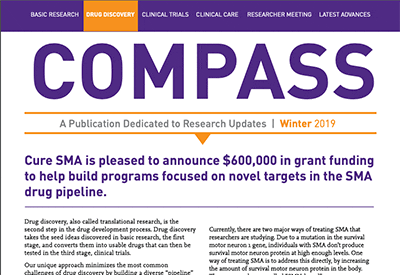Cure SMA has awarded a $150,000 research grant to Robin Parks, PhD, at the University of Ottawa, for his project, “Serum-derived exosomes as a biomarker for Spinal Muscular Atrophy.”
Dr. Parks and his team are exploring the use of exosomes, small particles released from all cells, as potential biomarkers for SMA. They have shown that SMN protein is naturally released in exosomes from all cell types examined. Furthermore, when using a mouse model, the quantity of SMN protein contained in the serum-derived exosomes correlated with the disease status of the animal, with progressively less protein in the carrier and SMA affected animals compared to wildtype mice. In humans, SMN protein was also easily detectable in exosomes isolated from human serum, with a reduction in the amount of SMN protein contained in exosomes from a patient with Type 3 SMA compared to a healthy control.
Taken together, these results indicate that the amount of SMN protein contained in exosomes correlates to the level of SMN protein within the originating cell in both patients and mouse models, and suggests that analysis of exosome-derived SMN protein may serve as an effective biomarker for SMA. In this proposal, Dr. Parks and his team will build upon these exciting preliminary results, and further explore the utility and accuracy of analyzing SMN protein levels in serum-derived exosomes as a biomarker for SMA.
Meet Dr. Parks
Who are you?
I am a Senior Scientist at the Ottawa Hospital Research Institute in Ottawa, Ontario, Canada, as well as a Full Professor at the University of Ottawa. I serve as the Co-Director of the University of Ottawa Centre for Neuromuscular Disease, which brings together over 60 basic scientists and clinical researchers that work on various aspects of neuromuscular disease. Work in the Parks laboratory is primarily directed towards studying aspects of virus biology (specifically adenovirus, a common cold virus) as it pertains to its use as a gene delivery vehicle in gene therapy applications. More recently, our work has evolved into other “nanotechnologies” like exosomes. Exosomes are small particles released from all cells and can be easily isolated from blood or serum samples. Analysis of protein or DNA contained in exosomes can frequently provide insight into the “health” of the cell from which they are released – so studying exosomes isolated from the blood of patients is a simple method that can potentially provide insight into the health of the patient.
How did you first become involved with SMA research?
Ottawa has one of the highest concentration in the world of basic and clinical researchers working on neuromuscular diseases such as SMA. Many years ago, Dr. Rashmi Kothary, an Ottawa-area expert in SMA, sought our help to investigate gene therapy approaches to treat SMA. As someone who primarily studies viruses, I had little knowledge of what SMA was. I became more involved with local patients and families affected by neuromuscular disease, and became inspired to try to help however I can. As I learned more about SMA, my lab started to ask our own research questions, and realized that perhaps we had something to offer to the field. We hope that our work will uncover new insight into SMA disease and, hopefully, uncover new strategies to treat the disorder.
What is your current role in SMA research?
Exosomes are small microscopic particles released from all cells, almost like little bubbles, and they are found in high numbers in blood. Exosomes contain a sampling of the proteins that were in the cell, and thus they are an easy way to assay the “health” of the cell. We found that SMN protein is also released from cells in exosomes, and the level of SMN protein in exosomes isolated from patients is less than what we see in samples from unaffected individuals. We are investigating whether we can use a simple blood assay to monitor responses to therapies that act through increasing SMN protein levels in the cell.
What do you hope to learn from this research project?
Our objective is to develop a novel assay, based on a simple blood sample, that can be used to characterize spinal muscular atrophy disease severity and response to treatment.
How will this project work?
We will obtain blood samples from patients with SMA before and during treatment with Spinraza and monitor the levels of SMN protein in small vesicles within the blood termed exosomes. In response to therapies that act through increasing the expression of SMN protein, we should see an increase in the amount of SMN protein in these vesicles isolated from blood.
What is the significance of your study?
Successful completion of our work will lead to the development of a simple, minimally-invasive assay that can be used to monitor the response of patients with SMA to therapy, which would enhance our ability to monitor response in clinical trials.
Basic Research Funding
This grant to Dr. Parks was funded through Cure SMA – Canada and is part of $1,325,000 in new basic research funding that we’re currently announcing.
Basic research is the first step in our comprehensive research model. We fund basic research to investigate the biology and cause of SMA, in order to identify the most effective strategies for drug discovery. We also use this funding to develop tools that facilitate SMA research.



